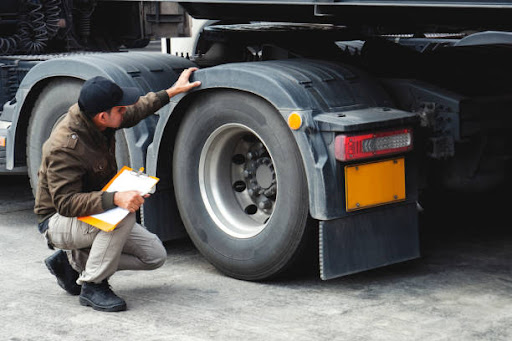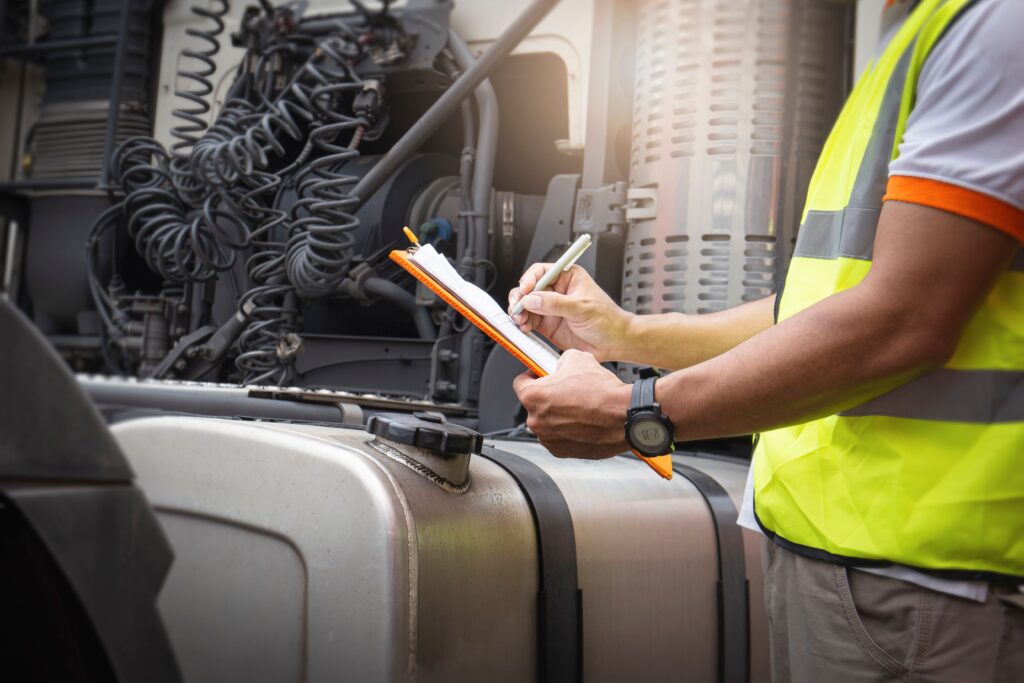Preventive maintenance is a must for any machine operating at peak performance. Maintaining your equipment includes little tasks like cleaning and oiling, checking fluid levels, or doing visual inspections on parts of your truck you can see, such as clutches, etc.

Maintaining preventive components in commercial trucks should stay on our radar because when these things go wrong, it costs much more than if we had just done routine service work upfront!
Importance of Preventive Maintenance
Preventive maintenance is vital for any business that relies on vehicles, but it’s especially crucial for semi-trucks.
Regular preventive maintenance can help to ensure that semi-trucks are safe and reliable. Including preventive maintenance in your business plan is a smart move.
It will help to keep your semi-trucks running smoothly and avoid costly repairs down the road. It’s been estimated that for every dollar spent on preventive maintenance, businesses can save $100 in future repair costs.
10 Essential Elements of Preventive Maintenance for Semi-Trucks
1. Check fluid levels and top up as necessary
Regularly checking your fluid levels and topping them up as needed is a simple and effective way to keep your truck in good condition. By doing this, you can help prevent serious issues with your engine and maintain your truck on the road.
The correct amount of fluid can vary depending on the make and model of your truck, so be sure to consult your owner’s manual. However, you should generally check your engine oil, coolant, power steering fluid, and transmission fluid levels at least once a month.
If you notice that any of these fluids are low, top them up. You can usually find the appropriate fluids at your local truck stop or auto parts store. Be sure to use the correct type of fluid for each system – using the wrong kind of fluid can cause damage to your truck.
2. Inspect tires for proper inflation and tread depth
Your tires keep you moving down the road, so it’s essential to ensure they’re in good condition. Tires can lose air pressure over time, which can lead to problems. Underinflated tires can overheat and fail.
It’s also important to check the tread depth on your tires. If the tread is too shallow, it can cause hydroplaning and loss of traction. You should check your tires regularly to ensure they’re in good condition.
3. Check brakes for proper operation
Effective brakes are essential for safety and avoiding damage to your vehicle. You can do a few simple things to keep your brakes in good shape. First, check them regularly for wear and tear. If you notice any unusual wear or damage, have them repaired or replaced ASAP.
Second, keep them clean and free of debris. This will help ensure they work smoothly and effectively. Third, avoid using your brakes excessively, which can cause them to wear out more quickly. By following these simple tips, you can help ensure your brakes remain in good condition and help avoid any costly repairs or replacements.
4. Check hoses and belts for wear and tear
Checking hoses and belts for wear and tear is vital in preventive maintenance. Hoses are responsible for carrying fluids throughout the engine, so checking them regularly for leaks or cracks is essential. If a hose is damaged, it could cause a loss of power or even an engine fire.
Belts are another critical component of the truck’s engine. They help to drive the alternator, water pump, and other accessories. Over time, belts can stretch and wear out, so it’s essential to check them regularly for signs of wear. If a belt is damaged, it could cause the engine to overheat or break down.
5. Test lights, signals, and mirrors for proper function
It’s essential to regularly test your truck’s lights, signals, and mirrors to ensure they are functioning correctly. This includes your headlights, taillights, brake lights, turn signals, and hazard lights.
Effective communication with other drivers is crucial to avoid accidents or damage to your vehicle. Keeping your truck in top condition can help ensure a smooth and safe ride for everyone on the road.
6. Inspect the exhaust system for leaks or damage
The exhaust system on a semi-truck is vital for maintaining effective engine operation. Over time, the exhaust system can become damaged or develop leaks. These issues can lead to engine problems and decreased fuel efficiency.
Regular exhaust system inspections can help prevent these problems. Look for any signs of damage or leaks. If you notice any issues, have the system repaired or replaced as soon as possible.
7. Check engine oil level and condition
Engine oil is critical in keeping your truck’s engine running smoothly. It helps to lubricate the moving parts and avoid damage from friction. When engine oil is not changed regularly, it can break down and become less effective over time. This can lead to engine problems and expensive repairs.
Regularly checking your engine oil level and condition can help you avoid these issues. If you notice that the oil is dirty or smells burnt, it’s time to change it.
If you don’t feel comfortable doing this yourself, you can take your truck to a qualified mechanic. They will be able to advise you on the best oil for your truck and help you keep it in top condition
8. Check the air filter and replace it if necessary
A dirty air filter can decrease the efficiency of your engine, and over time it can cause damage. Replacing the filter is a cheap and easy way to keep your truck running smoothly and avoid expensive repairs down the road.
So next time you’re doing regular maintenance, check the air filter and replace it if necessary. It’s a simple step that can save you a lot of money and hassle in the long run.
9. Clean windshield and windows inside and out
Driving with a clear vision and avoiding glass damage will help you see the road better. To clean the windshield and windows effectively:
- Start using a soft cloth or sponge to remove any dirt or debris.
- Wipe down the surface with a lint-free cloth and glass cleaner.
- Make sure the windshield and windows are clean inside and out.
Consider using a long-handled brush or squeegee if you have difficulty reaching certain areas. Always remember to avoid using harsh chemicals or abrasives, as these can damage the glass. With some care and effort, you can keep your windshield and windows clean and clear and help ensure a smooth ride for yourself and your cargo.
10. Perform general chassis lubrication
By keeping the moving parts of the truck’s chassis well-lubricated, you can avoid damage and keep your truck running smoothly. Adequate chassis lubrication can also help improve fuel economy.
Regularly check your truck’s chassis’ lubrication level and add more as necessary. Make sure you use a suitable lubricant for your truck. If you need help deciding what oil to use, consult your truck’s owner’s manual or a qualified mechanic.
What to Do During a Preventive Maintenance Visit
Like most people, you probably don’t think too much about preventive maintenance visits for your semi-truck. After all, it’s something that everyone must do to keep the truck running smoothly, right?
Quite the opposite. Keeping your truck in top condition and avoiding costly repairs requires preventative maintenance. Not to mention, they can help you avoid accidents and breakdowns.
So what should you do during a preventive maintenance visit?
- Important things: Ensure the right oil, filters, and other fluids are on hand. Also, check your truck’s brakes, tires, and other vital components.
- Keep in mind: Preventive maintenance visits are an excellent time to check for any potential problems with your truck. If you notice anything that doesn’t seem right, bring it up with your mechanic.
- Things to consider: How often you need a preventive maintenance visit depends on how much you use your truck. If you’re on the road constantly, you’ll need to have more frequent visits than someone who only uses their truck occasionally.
Advantages of Preventive Maintenance for Semi-Truck
Preventive maintenance is one of the most brilliant things you can do for your semi-truck, trucking company, or logistics operation. Keeping your vehicles in top condition will help ensure their safety and performance on the road.
There are many advantages to preventive maintenance:
- You can avoid costly repairs. Regular check-ups and servicing can identify potential problems early on before they cause significant damage.
- Preventive maintenance will help keep your vehicles running at peak efficiency. Your vehicle will run more efficiently and have fewer breakdowns, saving you money.
- Preventive maintenance is a great way to improve safety.
Ensuring your trucks are in good working order can help prevent accidents and keep your drivers safe.
So don’t wait until something goes wrong – start practicing preventive maintenance today.
